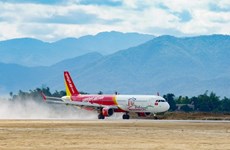Workshop discusses impacts of global changes on Vietnam marine transport
 Delegates discussing at the event (Photo: VNA)
Delegates discussing at the event (Photo: VNA)HCM City (VNA) - New regulations and development in the global economy will have a strong impact on Vietnamese shipping, a conference held to discuss Vietnam’s Maritime Future heard in Ho Chi Minh City on November 13.
Organised just ahead of the Asia Pacific Maritime 2020 exhibition and conference, the event, organised by Asia Pacific Maritime (APM), gathered maritime experts from Vietnam and neighbouring countries.
The Vietnamese marine transport sector is growing steadily, with goods transported by the country’s fleet exceeding 81 million tonnes in the first half of 2019, a year-on-year increase of 16 percent.
The Vietnam Maritime Administration said in the period the country’s ports handled 308.8 million tonnes of goods, up 13 percent.
Yeow Hui Leng, group project director, APM, said Vietnam has developed significantly over the past three decades and its economic outlook remains bright despite economic headwinds and global uncertainties.
She added that however, the country will need to stay on top of tightening regulations and modernise.
The biggest change facing global shipping is the International Maritime Organisation (IMO)’s new global sulphur cap that comes into effect in January. From then ships will have to use fuel with a sulphur content of no more than 0.5 percent compared to 3.5 percent now.
The change poses a great technical challenge for ship owners. Besides, it will increase costs, and major shipbuilders in Japan, the EU and the US are looking for ways to use liquefied fuel to reduce costs, the conference heard.
Participants suggested ships should switch to methanol.
Another issue discussed at the event was digitisation in the shipping industry.
Delegates said though Vietnam’s shipping industry is poised for growth, many players have outdated maritime assets and limited access to capital, which hinders digitisation.
The Vietnam Maritime Department issued a call in late 2018 for the industry to accelerate the adoption of industry 4.0 technologies.
Bui Van Trung, secretary general, Vietnam Shipowners Association said the country’s fleet consists mostly of second-hand ships, many of which have technologies 15 years old or older, and this puts Vietnam at a disadvantage amid fierce competition from newer ships belonging to foreign owners.
According to Trung, while modernisation is a must to survive, it is also a grave problem for the shipping companies, chiefly because of low profitability in the business and lack of funds, especially from commercial sources.
The current shortage of skilled maritime manpower is also another problem for ship owners, he said./.













